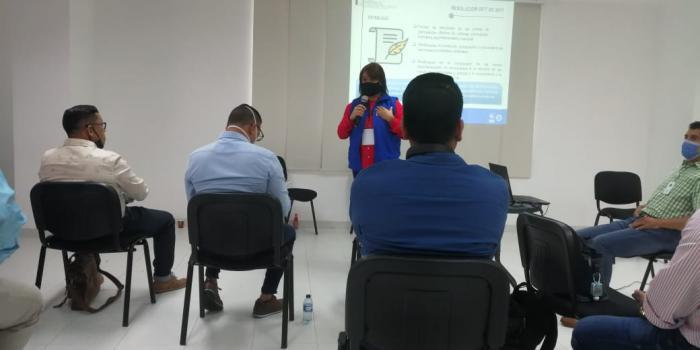
Atlantic City Mayors are trained in the Victim Participation Protocol
The Victims Unit trains local authorities on the participation of victims to strengthen, facilitate and protect effective advocacy mechanisms for victims and their organizations.

In development of the inter-institutional coordination carried out by the Victims Unit with the Government of Atlántico and municipal mayors to guarantee their effective participation and incidence in public policy spaces for victims, the Atlantic Territorial Directorate carried out this Friday a methodological training session on the Protocol of Participation of victims to government secretaries, of Social Management and links of victims of the District of Barranquilla and municipalities of Atlántico.
The main objective of the workshop carried out through a virtual platform was to socialize the normative and conceptual foundations and the structure of the process of effective participation of the victims of armed conflict, based on the functions and powers of the municipal authorities, and within the framework of the protocol of effective participation of victims issued by the Subdirectorate of participation of the Victims Unit. Likewise, recognize the importance of the participation of victims and identify key actors and spaces in the advocacy process.
The Territorial Director of the Victims Unit in Atlántico, Alfredo Palencia, explained that “the participation of the victims is the vehicle through which they influence to achieve the effective materialization of their rights lost in the conflict, overcome their condition as victims , and to achieve the status of political, economic, social and cultural citizenship, within the framework of a Social State of Law, as promulgated in the Colombian Constitution”.
Professionals from the Sub-Directorate of Participation at the national level, moderated the meeting, in which they highlighted that participation as a constitutional principle and of law, generates clear obligations to the State to protect, guarantee and promote said participation, especially when the target population has certain characteristics of vulnerability, which make it subject to special constitutional protection, in this case of the victims of Colombian conflict.
In order to achieve the goals of victim participation, the State must address the following aspects:
- Organize and generate coordination bridges between the different instances of victim participation at the municipal, district, departmental and national levels. In order for participation to be a fundamental part of the coordination of the entire comprehensive care and repair system.
- Strengthen the participation of victims in territorial spaces for discussion and agreement on public policies. Since it is locally where rights are materialized through these public policies.
- Provide processes for the formation of rights to victims, their organizations and society as a whole, in order to provide conceptual tools that allow victims to claim guarantees and rights, and that train all citizens to recognize, respect and help redress the damages of conflict.
- Guarantee the right to information, without which the participation of the victims cannot take place properly. This implies generating various means of information towards the Victims' Tables, organizations, and unorganized victims, where the mass media are especially involved.
- Help consolidate a culture of citizen participation among the victims, in order to help them overcome their condition of vulnerability, and restore their citizenship rights, which they lost due to the armed conflict.
- Establish a public management model for the fulfillment of victims' rights, which is supported and ends in their effective participation in the planning, construction and control of public policies.
(End/HDP/LMY)






